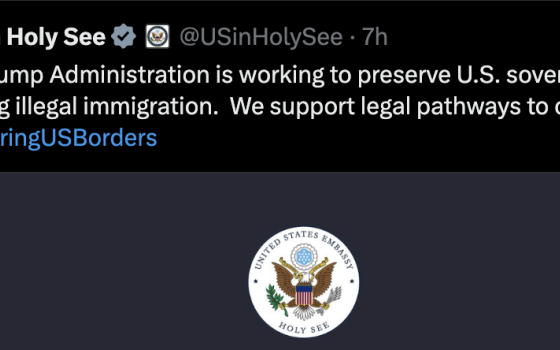The news of Archbishop Pietro Sambi’s death is shattering. Apostolic Nuncio to the United States since 2005, Sambi was, simply put, the best nuncio in my lifetime. In his relations with the U.S. government and with the Church in the U.S., his was a calming presence, a friendly face, and a listening ear.
I recall attending Notre Dame’s annual reception for the bishops on the eve of their November meeting in 2009, six months after several bishops had denounced the university for awarding an honorary doctorate to President Obama. Archbishop Charles Chaput accused Notre Dame at the time of “prostituting our Catholic identity,” Nasty stuff. But, Archbishop Sambi was one of the first to arrive at the Notre Dame reception, and one of the last to leave. He sat at the most conspicuous table in the room and held court. His presence said all that needed to be said.
He was, in essence, not only the personal representative of the Holy Father to these shores, he brought the spirit of “Romanitas” with him, the sensibility found among the historically learned – and who in Rome can be but historically learned when every street corner holds some evidence of long lost human grandeur – the sense that we should not inflate our egos by over-valuating our personal power but must learn to trust in the Lord of history. “Romanitas” is not the same thing as being sanguine, it has a peculiarly religious quality, a belief that if we intrude too much with our plans and our plots, we tend to leave little room for the Holy Spirit to work its will.
You could capture this sense in almost any of Sambi’s sermons, which were frequently televised when he presided at Masses at the National Shrine. I cannot once recall him wagging his finger at anybody. He was never a scold. The joy he took in the life of faith came tumbling out of him, albeit in heavily accented English. In his first address to the bishops meeting in 2006 in Baltimore gives a flavor of his approach: “I am not suggesting that the Bishops should be ‘watch-dogs’ of the faith; I am speaking of something much more difficult: the ‘munus docendi’ of the Bishop must lead the Faithful to live in gratitude to Almighty God for the gift of life, the gift of faith, the gift of the Church, the gift of service, the gift of joy and the gift of fidelity.” Rocco has the full text here. He made the faith appear attractive, never defensive, always open hearted. His personal manner exuded the same charism. He was almost always smiling, his hand extended, his conversation lively.
Once, at a reception at an event at Catholic University, he said that one of his most difficult problems was finding out who should be made a bishop. I replied, “I have a list.” He doubled over in laughter and, then, leaning forward, said, “Come and see me.” We had only met on a few occasions, so his openness and his frankness were disarming. How refreshing to be disarmed by a bishop’s openness rather than his imperiousness! Another time, outside St. Matthew’s Cathedral, I began to introduce him to a friend. They had met before but only once and that at a large reception where Archbishop Sambi had met dozens of people. I got no further than, “Archbishop, this is…” when he cut me off and said, “I know him.” A second later my friend was engulfed in a Sambi bear hug. He recalled their only prior meeting with precision and made my friend, who was not a Catholic, feel very special.
During his tenure, the Church in the U.S. faced some difficult challenges. Sambi, in conjunction with Cardinal Justin Rigali, handled the delicate task of removing Bishop Joseph Martino from Scranton. Martino had alienated his clergy and his flock. He famously threw a tantrum at an event where the faithful had gathered to discuss the USCCB document “Faithful Citizenship” shouting that the conference had no authority in his jurisdiction. Removing a bishop is a rare event, but Sambi handled the situation with delicacy but firmness. Likewise, he played a role in transferring then-Archbishop Raymond Burke to Rome in advance of the 2008 elections. Some note that the appointment was a promotion, but most observers concluded that it was an instance of promovere ut movere – promote in order to move.
Archbishop Sambi reminded the hierarchy that the Good Shepherd goes off in search of the lost sheep, he does not close the gate and hurl epithets. As Bishop Robert Lynch of St. Petersburg, Florida said of Archbishop Sambi in a posting on his website last night, “in his own words he encouraged us, challenged us to be more open than perhaps we are and less iron-fisted.” His appointments reflected this desire that bishops be less “iron-fisted.”
Rumors had been circulating for months that Archbishop Sambi was to be recalled to Rome and given a much-deserved red hat and a high profile Vatican post. But, God called him home instead. We must pray for him as we pray for all the dead, but we do so in the sure hope in the resurrection. “Blessed are the merciful, for they shall obtain mercy,” said the Master in the Sermon on the Mount. Archbishop Sambi can go before the Judgment Seat of God with full confidence not only in the mercy of God, upon which we must all rely, but in the confidence that in his earthly ministry, he proclaimed that mercy to those whom he encountered.


